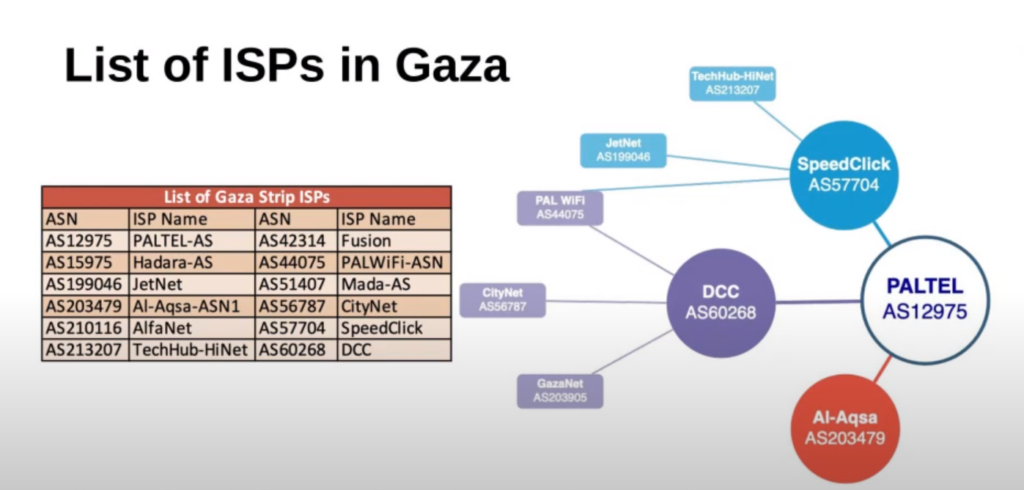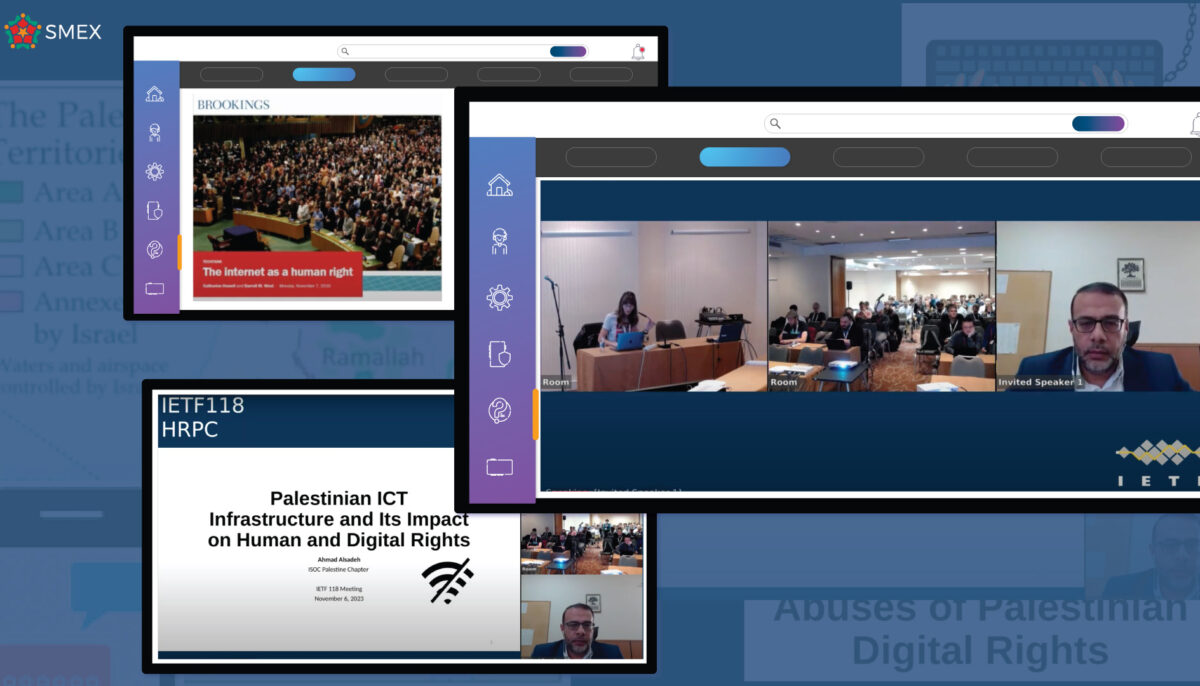In today’s world, the internet is a basic right and need, as it is a gateway through which people access other indispensable rights and needs, such as knowledge and education, as well as government services and job opportunities. The internet also enables people to practice their right to freedom of opinion and expression and to learn about and access healthcare services.
Amid the current war on Gaza, the internet is also a tool for survival, marking the difference between life and death for hundreds of thousands of people under bombardment, food scarcity, and obliterated healthcare infrastructure.
In 2016, the United Nations confirmed that users’ access to the internet is a human right rather than a secondary privilege.
During a session organized by the Internet Engineering Task Force (IETF) on the Palestinian ICT Infrastructure and its Impact on Human and Digital Rights on October 6, Ahmed Saada, president of the Internet Society (ISOC) Palestine branch, delved into the details of how Israel deprives Palestinians of their fundamental right to internet access.
First, to understand the historical and geographical context of how telecommunications and internet services are provided and distributed on Palestinian territories, it is necessary to delve into the governance structures introduced by the Oslo Accord signed in 1993 by the occupation forces and the Palestine Liberation Organization (PLO).
According to the Oslo Accord, Palestinian territories are split into three areas:
Area A: Covers 18% of the West Bank and is administered by the Palestinian Authority.
Area B: Covers 22% of the West Bank; the Palestinian Authority exercises civil control over Area B but shares security control with Israeli authorities (in practice, this area is under full Israeli control).
Area C: Covers 60% of the West Bank and is under full Israeli rule.

Nevertheless, Israeli occupation forces restrict Palestinians’ access to technology and network frequencies. For more than 10 years, Palestinians have demanded access to 3G networks in the West Bank. And although the network went online in 2018, it is still prohibited in Gaza, where only 2G networks are allowed. To this day, Palestinians do not have access to 4G networks, but the Palestinian Authority agreed with the occupation authorities to offer a 4G connection in the West Bank and the Gaza Strip at the end of 2023. Ooredoo and Jawwal, the two telecom companies in the West Bank, have nearly 4.3 million subscribers.
In addition, occupation forces restrict Palestinians’ access to global technologies. In fact, it is difficult for Palestinians to buy equipment, routers, telecom towers, and other tools necessary to develop the telecom infrastructure. None of this equipment can be purchased without Israeli approval. Even in areas controlled by the Palestinian Authority, the occupation prohibits Palestinians from buying any power converters or equipment. As for Ooredoo’s switches, they are located in the UK and Jordan, while Jawwal’s switches are located in East Jerusalem.
Furthermore, the occupation restricts the import of necessary equipment without any transparent rules or laws. For example, Palestinians who wish to import telecom equipment have to submit requests to the occupation authorities specifying in detail the merchandise they intend to import, the extent to which they meet Israeli standards, and their potential civilian and military uses. This has caused a significant technological gap and has forced Palestinians to make do with the poor telecom infrastructure and services.
How Occupation Forces Violate Palestinians’ Digital Rights
1. By restricting Palestinian’s right to communicate and to access the internet.
- World Bank reports show that Jawwal and Wataniya (Ooredoo) need to build 300 telecom towers in Area C to ensure “good” coverage in the West Bank.
- The restrictions imposed by the occupation on the enhancement of Palestinian ICT infrastructure undermine communication and integration between the inhabitants of the West Bank and the Gaza Strip.
Internet access is a human right, and any violations thereof are a breach of the freedom of expression and the right to access and use information.
2. By violating the right to privacy.
- Occupation forces constantly track and monitor Palestinians by installing CCTV cameras that include facial recognition features everywhere to track their movement.
- Occupation forces blackmail Palestinians using personal information they gather about them and threaten to publish this information if Palestinians do not collaborate with them and spy on their behalf.
- Occupation forces can control Palestinians’ phones to make calls and send text messages.
- Israel uses spyware such as Pegasus (an Israeli spyware) to spy on Palestinians.
3. By violating the right to freedom of expression.
- Occupation forces monitor Palestinians’ activity on social media and arrest them based on their posts.
- After the events of October 7 alone, nearly 161 Palestinians have been detained and subjected to investigation due to their activity on social media.
- Employees have been fired due to posts they shared on the war in Gaza.
- Between 2015 and 2018, nearly 500 Palestinians were detained for expressing their opinions on social media.
- Occupation forces enforce military laws and accuse Palestinians of instigation when they express their opinions on social media, using their posts as a pretext to arrest them.
Internet Shutdown in Gaza
After October 7, the telecom infrastructure in Gaza was severely damaged, causing the availability of telecom services to drop to less than 20%.
As of October 31, 15 of the 19 internet service providers operating in Gaza were facing a complete shutdown of their mobile and broadband services, and the remaining four were each experiencing significant but varying levels of disruption, impacting millions of people. Complete shutdowns have directly affected an estimated 411,000 people using these providers in Gaza, as well as an additional 34,000 people in the West Bank.

This report by SMEX and AccessNow maps out the main internet service providers (ISPs) in Gaza, with a case-by-case analysis of connectivity and changes in internet traffic for each ISP between October 4 and 31, 2023.
Internet shutdowns in Gaza constitute a violation of Palestinians’ human and digital rights because they:
- Prevent Palestinians from communicating with each other and from asking for help from local and international agencies
- Suppress news and reporting from inside Gaza
- Enable the occupation to commit more crimes
- Cause the spread of misinformation
- Cut off news and updates from areas under attack
Findings and Recommendations
By prohibiting Palestinians from accessing the internet, occupation forces are violating Palestinians’ human and digital rights, specifically their right to freedom of expression. This constitutes a digital occupation that Palestinians have to endure on a daily basis.
Therefore, the speakers demanded that the Israeli occupation:
- Stop the illegal monitoring of Palestinians, especially in the digital realm.
- Respect Palestinians’ right to freedom of expression and privacy.
- Refrain from restricting Palestinians’ ability to enhance their telecom infrastructure.



